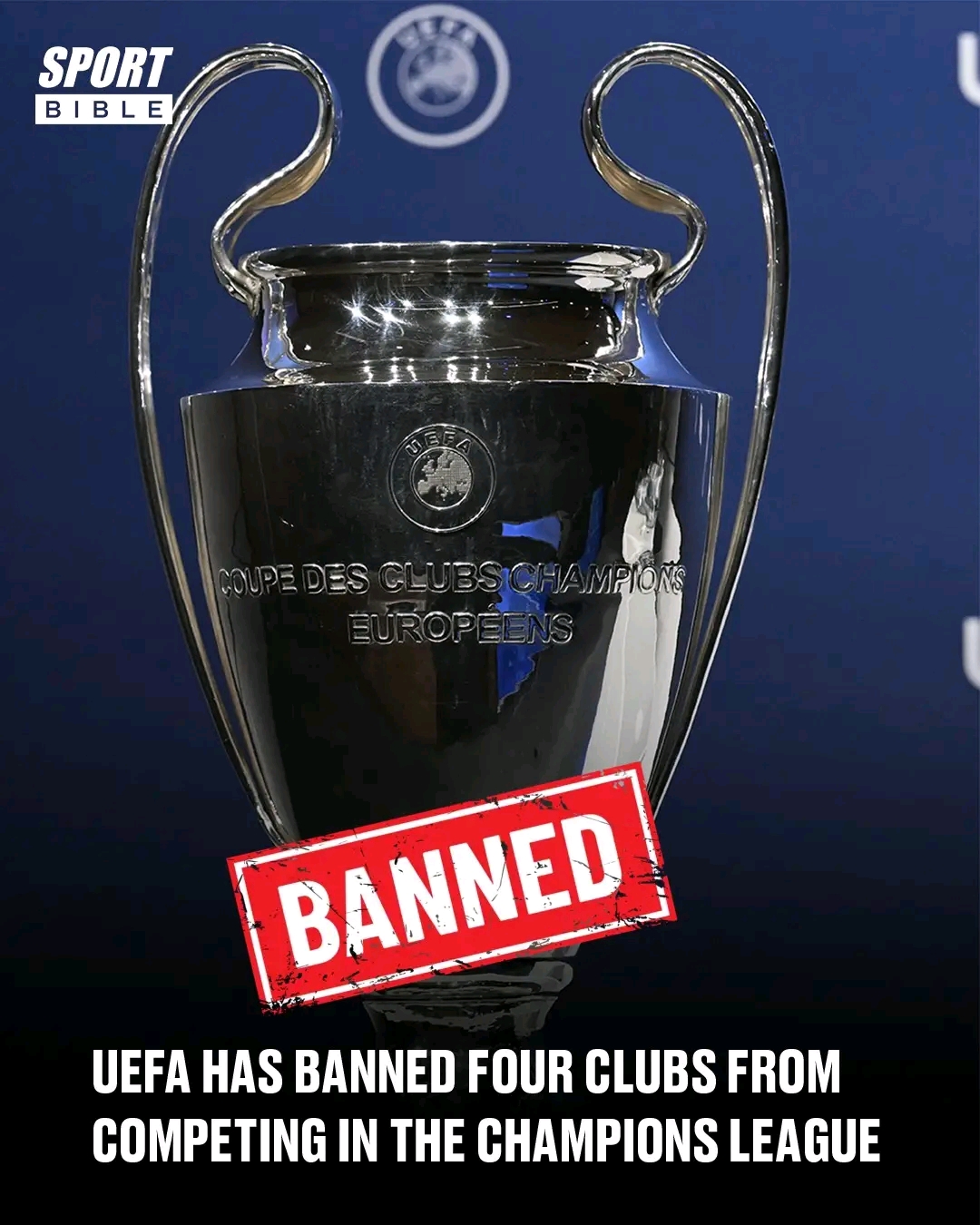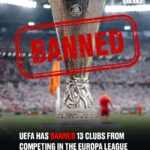UEFA Champions League Bans: A Comprehensive Analysis of Disciplinary Actions in European Football

The UEFA Champions League stands as the pinnacle of European club football, representing the highest level of competition where the continent’s most prestigious clubs battle for glory. Since its inception in 1955 as the European Cup, this tournament has evolved into a global spectacle that captivates millions of football fans worldwide. However, beneath the glamour and excitement lies a complex regulatory framework designed to maintain the integrity of the competition. UEFA, the governing body of European football, has demonstrated its commitment to upholding these standards through decisive disciplinary actions, including the controversial step of banning clubs from participation.
The Champions League represents more than just a football tournament; it embodies the dreams and aspirations of clubs across Europe. With Real Madrid leading the way with an impressive 15 titles, the competition has become synonymous with footballing excellence. English clubs have also made their mark, with Liverpool’s six European Cup victories making them the most successful Premier League side in the tournament’s history. The financial implications are equally staggering, with participation alone worth millions of euros to clubs through prize money, television revenue, and increased commercial opportunities.
This elevated status makes exclusion from the Champions League particularly devastating for clubs. A ban not only represents a loss of prestige but also significant financial consequences that can impact a club’s ability to compete at the highest level for years to come. Understanding the cases where UEFA has wielded this ultimate sanction provides crucial insight into the organization’s regulatory approach and the serious nature of the violations that warrant such extreme measures.
The Turkish football landscape was forever altered in 2013 when two of the country’s most prominent clubs found themselves at the center of a massive match-fixing scandal that sent shockwaves throughout European football. The revelations exposed a web of corruption that had been undermining the integrity of domestic competitions and threatened to taint Turkey’s reputation in international football.
Besiktas, one of Turkey’s most storied football institutions, became the first major casualty of UEFA’s investigation into domestic match-fixing. The club, which had built its reputation over more than a century of football history as one of Istanbul’s “Big Three” alongside Galatasaray and Fenerbahce, found itself facing unprecedented sanctions from European football’s governing body.
The investigation revealed evidence suggesting Besiktas had been involved in manipulating domestic match results, a practice that strikes at the very heart of competitive integrity. UEFA’s disciplinary committee took a firm stance, imposing a one-year ban from all European competitions. The club’s subsequent appeal to the Court of Arbitration for Sport proved unsuccessful, confirming the severity of the violations and UEFA’s determination to send a clear message about the consequences of match-fixing.
For Besiktas, the ban represented more than just a temporary setback. The club was forced to watch from the sidelines as European football’s elite competed for continental glory, missing out on crucial revenue streams and the opportunity to showcase their talents on the biggest stage. The psychological impact on players, management, and supporters was profound, serving as a stark reminder of how quickly success can turn to disgrace when ethical boundaries are crossed.
Fenerbahce, arguably Turkey’s most internationally recognized football club, faced an even more severe punishment for their alleged involvement in the same match-fixing scandal. UEFA imposed a two-year ban on the Istanbul giants, effectively doubling the punishment meted out to their rivals Besiktas. This harsher sentence reflected the extent of Fenerbahce’s alleged involvement and served as a powerful deterrent to other clubs considering similar actions.
The timing of the ban proved particularly cruel for Fenerbahce. As they were appealing UEFA’s decision, the club participated in a Champions League playoff against Arsenal, one of England’s most prestigious clubs. The match represented a tantalizing glimpse of what European competition could offer, but their subsequent loss to the Gunners would mark their final Champions League appearance for several years. The irony was not lost on observers – a club with a proud European heritage was being forced into exile just as they were demonstrating their competitive capabilities on the continental stage.
The Fenerbahce case highlighted the global reach of UEFA’s disciplinary powers. Even clubs with significant international followings and commercial partnerships were not immune from punishment when they violated the organization’s strict ethical standards. The ban forced Fenerbahce to rebuild their reputation from the ground up, focusing on domestic success while working to restore their standing with European football authorities
While Turkish clubs were grappling with match-fixing allegations, Italian giants Juventus found themselves embroiled in a different type of controversy that would ultimately lead to their exclusion from European competition. The Turin-based club, one of Serie A’s most successful teams with a rich history spanning over a century, faced accusations of breaching UEFA’s Financial Fair Play (FFP) regulations.
Financial Fair Play rules were introduced by UEFA to promote financial stability and prevent clubs from accumulating unsustainable debt while ensuring competitive balance across European football. These regulations require clubs to balance their football-related expenditure with their revenue over a specified monitoring period, preventing wealthy owners from simply pumping unlimited funds into their teams without regard for financial sustainability
Juventus’s alleged violations were deemed serious enough to warrant a suspension from UEFA competitions for the 2023-24 season. This punishment came at a particularly challenging time for the club, which was already dealing with the aftermath of various financial investigations and regulatory scrutiny. The ban meant that Juventus, despite their on-field success in Serie A, would be unable to participate in the Champions League or Europa League, depriving their fans of European football and significantly impacting their revenue streams.
The case against Juventus represented UEFA’s evolving approach to financial regulation in modern football. As transfer fees and player salaries continued to spiral upward, the governing body recognized the need for stronger enforcement mechanisms to prevent financial misconduct. The suspension of such a high-profile club demonstrated UEFA’s willingness to take decisive action against even the most prestigious organizations when they violated financial regulations.
The implications extended beyond Juventus itself, sending a clear message to other clubs about the serious consequences of financial misconduct. The ban served as a powerful reminder that UEFA’s Financial Fair Play rules were not merely guidelines but enforceable regulations with real teeth. For Juventus, the suspension represented not just a temporary setback but a fundamental challenge to their business model and competitive strategy.
Among all the UEFA bans examined, none was as severe or long-lasting as the eight-year suspension imposed on North Macedonian club FK Pobeda in 2009. This extraordinary punishment, the longest on record for such violations, stemmed from allegations of match manipulation that struck at the very foundation of competitive integrity in European football.
The case against FK Pobeda centered on irregular betting patterns observed in relation to a Champions League qualifier against Armenian club FC Pyunik. UEFA’s investigation revealed evidence suggesting that the outcome of the match had been manipulated, a violation that goes to the heart of what makes competitive sport meaningful. The manipulation of match results not only cheats fans and legitimate competitors but also undermines the entire betting industry and can facilitate criminal enterprises.
The eight-year ban was unprecedented in its severity, effectively ending the careers of many players who were with the club at the time of the violation. For a smaller club like FK Pobeda, which relied heavily on European competition for both revenue and international exposure, the ban represented an existential threat. The punishment was designed not just to penalize the specific violation but to serve as a deterrent to other clubs considering similar actions.
The case highlighted UEFA’s commitment to maintaining the integrity of all its competitions, regardless of the size or prominence of the clubs involved. While FK Pobeda may not have had the international profile of clubs like Juventus or Fenerbahce, UEFA’s investigation and subsequent punishment demonstrated that all participants in European competitions are held to the same standards.
The severity of the punishment also reflected the seriousness with which UEFA views match manipulation. Unlike financial violations, which primarily affect competitive balance and club sustainability, match-fixing strikes at the fundamental premise that sporting competitions are fair and genuine contests. The eight-year ban sent an unmistakable message that such violations would be met with the harshest possible punishment.
While not ultimately serving a UEFA ban, Manchester City’s case deserves mention as it illustrates the complex legal landscape surrounding UEFA’s disciplinary powers. In 2020, UEFA imposed a two-year ban on the English Premier League champions for alleged serious breaches of Financial Fair Play rules. The ban was seen as one of the most significant disciplinary actions in modern football, given Manchester City’s status as one of the world’s wealthiest and most successful clubs.
However, the case took a dramatic turn when Manchester City successfully appealed the decision to the Court of Arbitration for Sport (CAS). The appeal process revealed the challenges UEFA faces in enforcing complex financial regulations, particularly when dealing with clubs that have the resources to mount sophisticated legal challenges. CAS overturned the ban, citing issues with the evidence and the timing of certain allegations.
The Manchester City case highlighted several important aspects of UEFA’s disciplinary process. First, it demonstrated that even the most severe punishments could be successfully challenged through proper legal channels. Second, it revealed the complexity of modern football finances and the difficulties inherent in investigating and proving financial misconduct. Finally, it showed that UEFA’s disciplinary powers, while significant, are not absolute and remain subject to independent legal review.
The overturning of Manchester City’s ban also raised questions about the effectiveness of Financial Fair Play regulations and UEFA’s ability to enforce them consistently. Critics argued that wealthy clubs could simply use their financial resources to challenge UEFA’s decisions through expensive legal proceedings, potentially undermining the deterrent effect of the regulations.
The cases of clubs banned from UEFA competitions reveal several important trends in modern football governance. First, they demonstrate UEFA’s willingness to take decisive action against clubs that violate its regulations, regardless of their size, history, or commercial importance. From major clubs like Juventus and Fenerbahce to smaller organizations like FK Pobeda, no club is considered too big or too small to face sanctions.
Second, these cases highlight the evolving nature of football regulation. While traditional concerns like match-fixing remain important, UEFA has increasingly focused on financial violations as player salaries and transfer fees have reached astronomical levels. The introduction and enforcement of Financial Fair Play rules represent a significant shift in how European football is governed, with greater emphasis on financial sustainability and competitive balance.
Third, the cases demonstrate the global reach of UEFA’s authority. Clubs from Turkey, Italy, North Macedonia, and beyond have all faced sanctions, showing that UEFA’s disciplinary powers extend across the continent and apply equally to all member associations. This consistent application of rules helps maintain the credibility and integrity of European competitions.
The financial implications of UEFA bans cannot be overstated. Exclusion from the Champions League alone can cost clubs tens of millions of euros in prize money, television revenue, and commercial opportunities. For many clubs, European competition is essential for maintaining their competitive position and attracting top players. A ban can therefore create a vicious cycle where clubs struggle to remain competitive, making it even harder to return to European competition once their suspension ends.
The history of UEFA bans provides valuable lessons for clubs, regulators, and football stakeholders. For clubs, these cases serve as stark reminders of the importance of maintaining high ethical and financial standards. The short-term gains from match-fixing or financial manipulation are vastly outweighed by the long-term consequences of exclusion from European competition.
For UEFA, these cases have helped refine and strengthen their regulatory framework. Each high-profile case has provided opportunities to improve investigation procedures, enhance evidence-gathering capabilities, and develop more sophisticated enforcement mechanisms. The organization has also learned the importance of clear communication about its regulations and the consequences of violations.
The cases also highlight the ongoing tension between competitive fairness and commercial interests in modern football. As clubs become increasingly valuable commercial enterprises, the pressure to succeed at any cost has intensified. UEFA’s disciplinary actions represent an attempt to maintain competitive integrity in an environment where financial incentives for misconduct continue to grow.
Looking forward, UEFA faces ongoing challenges in maintaining the integrity of its competitions. The increasing complexity of modern football finances makes Financial Fair Play enforcement particularly challenging, while new forms of potential misconduct, such as cyber-attacks and social media manipulation, present emerging threats to competitive integrity.
The cases of clubs banned from UEFA competitions represent some of the most significant disciplinary actions in modern football history. From the match-fixing scandals that rocked Turkish football to the financial violations that led to Juventus’s suspension, these cases demonstrate UEFA’s commitment to maintaining the integrity of European competition.
These bans serve multiple purposes: punishing violations, deterring future misconduct, and protecting the credibility of European football. While the punishments have been severe, they reflect the serious nature of the violations and the importance UEFA places on maintaining fair competition.
The impact of these bans extends far beyond the punished clubs themselves. They send clear messages to the entire football community about the standards expected and the consequences of failing to meet them. They also contribute to ongoing debates about governance, regulation, and the balance between commercial interests and sporting integrity in modern football.
As European football continues to evolve, UEFA’s disciplinary powers will remain crucial for maintaining competitive integrity. The cases examined here provide valuable precedents and lessons that will inform future regulatory decisions and help shape the ongoing development of European football governance.
The Champions League will continue to represent the pinnacle of European club football, but these cases remind us that participation in this prestigious competition comes with significant responsibilities. Clubs that fail to meet these obligations face the ultimate sanction: exclusion from the competition they most desire to join. In this way, UEFA’s disciplinary actions help preserve what makes the Champions League special – the knowledge that it represents not just the highest level of football, but also the highest standards of integrity and fair play.















